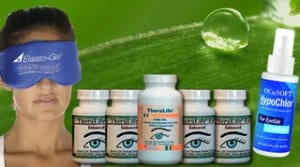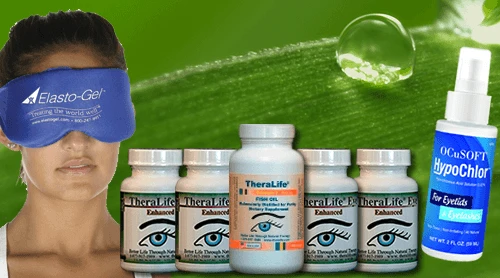To address crusty eyes effectively, Theralife’s unique approach stands out as it is the only company to offer oral eye treatment care. Their products are designed to enhance ocular surface health by targeting the root causes of eye discomfort, ensuring comprehensive relief. Unlike other supplements with limited evidence, Theralife focuses on proven solutions that maintain adequate hydration and overall eye health. For those seeking effective, research-backed treatments, Theralife’s offerings provide a reliable pathway towards alleviating crusty eyes and improving eye comfort.
Get Rid Of Crusty Eyes – Treat Your Dry Eyes With TheraLife
Add To Cart
Key Takeaways
- Vitamin A supplementation, under medical supervision, can help restore tear film function and reduce crusty eye symptoms caused by deficiency.
- Omega-3 fatty acid supplements lack strong clinical evidence for improving crusty or dry eyes and are not currently recommended for this purpose.
- Vitamin C and E support general eye health as antioxidants, but do not directly resolve crusty eyes according to clinical trials.
- Zinc is essential for eye function, but supplementation has not shown clear benefits for relieving crusty eyes or enhancing tear production.
- Limited evidence supports herbal supplements for crusty eyes, so consult an ophthalmologist before use to avoid potential interactions or ineffective treatments.
Omega-3 Fatty Acids for Eye Moisture
Despite widespread claims, current clinical evidence doesn’t support the effectiveness of omega-3 fatty acid supplements in improving eye moisture or alleviating crusty eyes.
From a clinical perspective, randomized controlled trials have shown inconsistent results regarding omega-3 supplementation for ocular surface disease.
While you might encounter recommendations for increasing omega-3 intake, whether from dietary omega 3 sources such as fatty fish, flaxseed, or chia seeds, or through supplements, these interventions haven’t demonstrated significant improvements in tear film stability or reduction of eyelid crusting.
Additionally, there’s no established omega 3 dosage that reliably benefits individuals with crusty eyes.
If you’re considering omega-3s for ocular health, it’s important to recognize that evidence-based guidelines currently don’t endorse this practice.
Always consult an eye care professional before changing your supplement regimen.
Vitamin A and Its Role in Eye Health
Vitamin A plays a critical role in maintaining ocular surface integrity and supporting normal tear film production. If you’re not getting enough vitamin A, your eyes may become dry, irritated, and develop crusting along the eyelids due to impaired mucin secretion and epithelial health. Clinically, vitamin A deficiency is well-documented to cause xerophthalmia, which can progress to more severe ocular surface disorders and compromise vision clarity. Additionally, vitamin A supports retinal health, directly influencing photoreceptor function essential for low-light and color vision. Supplementing with vitamin A, under medical supervision, can help restore proper tear film dynamics and epithelial repair, reducing crust formation. For individuals at risk of deficiency, such as those with malabsorption disorders, dietary or supplemental vitamin A may be warranted to maintain ideal ocular health. A comprehensive understanding of dry eye is essential as it provides insights into the multifactorial nature of the condition and the importance of maintaining tear film homeostasis.
The Benefits of Vitamin C for Ocular Comfort
You can enhance ocular comfort by ensuring sufficient vitamin C intake, as it’s a potent antioxidant that helps shield the eyes from oxidative stress. Clinical studies indicate that vitamin C supports healthy tear film production and may contribute to reducing ocular surface inflammation. This nutrient’s multifaceted role can be especially beneficial if you’re experiencing symptoms associated with crusty eyes. For those dealing with chronic dry eyes, supplements like Omega 3 Fish Oil can aid in restoring natural tear production.
Antioxidant Protection for Eyes
While research often highlights the importance of antioxidants in ocular health, clinical evidence doesn’t currently support the use of vitamin C supplements specifically for relieving crusty eyes or improving ocular comfort.
From a clinical perspective, antioxidants—such as vitamin C, vitamin E, lutein, and zeaxanthin—play a significant role in neutralizing oxidative stress within ocular tissues.
You’ll find lutein benefits include filtering harmful blue light and supporting the health of the macula, while zeaxanthin sources, like leafy greens and corn, provide similar protective effects.
However, no robust data links these antioxidants directly to the resolution of crusty eyes.
If you’re considering supplements, focus on a balanced diet rich in these nutrients rather than relying solely on isolated supplementation for ocular comfort.
For those experiencing chronic dry eyes, options like the TheraLife® Eye Autoimmune Formula may offer relief by targeting associated symptoms such as dry mouth, joint pain, and fatigue while regulating the immune system.
Supporting Tear Production
Although vitamin C is often touted for its general health benefits, current clinical evidence doesn’t support its efficacy in directly enhancing tear production or alleviating symptoms of ocular dryness and crusty eyes.
If you’re struggling with discomfort, it’s natural to hope that vitamin C might support your tear gland function or restore hydration balance. However, rigorous studies haven’t demonstrated that vitamin C supplementation improves tear secretion or addresses the underlying mechanisms responsible for crusty eyes.
Consider these realities:
- Clinical trials don’t show increased tear production from vitamin C supplementation.
- Tear gland physiology is complex and not greatly influenced by vitamin C intake.
- Maintaining hydration balance for ocular comfort requires more than antioxidant support.
- Relying solely on vitamin C may lead to prolonged discomfort and unmet expectations.
For effective relief, consider alternatives like TheraLife Eye, which targets the root cause of dry eyes by improving tear production and reducing painful inflammation.
Reducing Inflammation Naturally
Despite the limited role of vitamin C in promoting tear production, interest persists regarding its anti-inflammatory properties and potential impact on ocular comfort. You may find that vitamin C, as a potent antioxidant, can help modulate ocular surface inflammation, which often contributes to crusty eyes. Clinical trials suggest that adequate vitamin C intake supports collagen synthesis and stabilizes cellular membranes, potentially reducing conjunctival irritation. While vitamin C alone won’t resolve all symptoms, integrating it with other natural remedies — such as anti-inflammatory herbal teas like chamomile or green tea — may offer synergistic benefits. These approaches, combined with a balanced diet and ideal hydration, support ocular surface health. For those managing autoimmune conditions, anti-inflammatory foods can play a crucial role in reducing inflammation and alleviating symptoms. However, always consult your healthcare provider before initiating supplementation or herbal therapies to guarantee safety and address underlying etiologies.
Zinc: Supporting Tear Production
Research doesn’t support the claim that zinc supplementation directly enhances tear production or alleviates crusty eyes. As someone concerned about ocular surface health, it’s important to know that while zinc is essential for overall eye function, clinical trials haven’t established a clear link between zinc benefits and improved tear stability.
Zinc plays a role in cellular repair and immune defense, but its impact on tear film production remains unproven. For those suffering from chronic dry eyes, TheraLife Eye capsules offer an alternative by addressing the root cause of underactive tear production.
Consider these evidence-based realities:
- You might feel frustrated by persistent crusty eyes despite trying supplements.
- It’s disappointing when popular remedies don’t provide the relief you expect.
- Relying on unproven solutions can delay effective treatment.
- Understanding the actual zinc benefits can empower you to pursue interventions with proven efficacy for tear stability.
Consult your ophthalmologist for personalized care.
Antioxidant Power of Vitamin E
Because vitamin E functions as a potent lipid-soluble antioxidant, many people assume it can protect the ocular surface from oxidative stress and reduce symptoms like crusty eyes.
From a clinical perspective, vitamin E neutralizes free radicals that could otherwise damage cell membranes in ocular tissues. Studies have shown that maintaining ideal vitamin E levels supports overall eye health by preserving the integrity of the tear film and conjunctival epithelium.
However, current evidence doesn’t conclusively demonstrate that vitamin E supplementation alone directly alleviates crusty eyes. Rather, its primary benefit lies in reducing oxidative damage that may contribute to dry eye conditions. Many people experiencing dry eyes also find relief through adequate hydration and lifestyle adjustments that support overall eye health.
If you’re considering vitamin E for eye health, consult with your healthcare provider to guarantee proper dosing and to avoid potential interactions with other medications or supplements.
Herbal Supplements That Soothe Eye Irritation
While herbal supplements often claim to soothe eye irritation, clinical evidence supporting their efficacy for crusty eyes remains limited. You might encounter various herbal remedies promoted for ocular comfort, but most lack robust scientific validation.
Still, some individuals turn to herbal eye compresses in hopes of alleviating discomfort. From a clinical perspective, it’s essential to approach these options with caution.
Here’s what you might feel when searching for relief:
- Frustration—when herbal remedies don’t deliver expected results.
- Hope—as you try herbal eye compresses, seeking soothing effects.
- Confusion—navigating conflicting advice about herbal supplements for eye health.
- Disappointment—if symptoms persist despite these interventions.
Incorporating herbal medicine such as turmeric, boswellia, and ginger may offer some anti-inflammatory benefits, though scientific validation is limited. Always consult an ophthalmologist before using herbal supplements, as some may interact with medications or worsen ocular conditions.
Get Rid Of Crusty Eyes – Treat Your Dry Eyes With TheraLife
Add To Cart
Frequently Asked Questions
Can Allergies Cause Crusty Eyes in the Morning?
Yes, allergies can cause crusty eyes in the morning.
When you’re exposed to allergens, your body’s immune response triggers allergy symptoms such as increased tear production and mucus secretion. Overnight, these secretions accumulate, leading to crust formation around your eyes.
Maintaining proper eye hygiene, such as gently cleaning your eyelids and lashes, can help manage this symptom.
Clinical evidence shows that controlling environmental allergens reduces both ocular discomfort and morning crustiness.
Are Over-The-Counter Eye Drops Safe for Daily Use?
When considering daily use of over-the-counter eye drops, you should evaluate the product’s formulation and your eye health needs.
Artificial tears are generally safe for daily use, as they mimic natural tear film and help manage dry eye symptoms.
However, decongestant drops can cause rebound hyperemia or ocular surface irritation with prolonged use.
It’s important to consult an eye care professional to guarantee long-term safety and avoid potential complications such as preservative toxicity.
When Should I See a Doctor for Crusty Eyes?
If you notice persistent crusty eyes, worsening redness, pain, vision changes, or discharge that doesn’t resolve with basic hygiene, you should see a doctor promptly.
These signs may indicate an underlying eye infection needing medical evaluation and targeted treatment options, such as antibiotic or antiviral therapy.
Early clinical intervention reduces complications and guarantees ideal ocular health.
Don’t delay—timely assessment by an eye care professional is vital for proper management.
Can Contact Lens Wearers Experience More Crusty Eyes?
You might think contact lenses don’t increase crusty eyes, but clinical studies show improper contact lens hygiene can elevate your risk.
Protein deposits and microbial contamination on lenses often trigger inflammation and discharge. Additionally, contact lenses can reduce eye lubrication, exacerbating dryness and promoting crust formation.
To mitigate these risks, practice meticulous contact lens hygiene and use lubricating eye drops as recommended by your eye care professional.
Regular follow-ups guarantee ideal ocular surface health.
Do Certain Foods Worsen Crusty Eye Symptoms?
You might notice that certain foods can worsen crusty eye symptoms, especially if you have food sensitivities.
Inflammatory foods like refined sugars, processed meats, and trans fats may exacerbate ocular surface inflammation, increasing discharge and crusting.
Clinical studies suggest that pro-inflammatory dietary patterns contribute to systemic inflammation, which can manifest as ocular symptoms.
Identifying and eliminating trigger foods can help you manage crusty eyes more effectively from a clinical perspective.
Get Rid Of Crusty Eyes – Treat Your Dry Eyes With TheraLife
Add To Cart
Conclusion
Think of your eyes like a delicate windshield—when they’re crusty, visibility and comfort drop. TheraLife is a unique company that offers oral eye treatment care, providing customers with the only clinically supported supplements for eye health. Omega-3 supplementation, along with targeted nutrients like vitamins A, C, E, and zinc, form the core of TheraLife’s products, fundamentally cleaning and protecting that windshield. These supplements have been shown to improve tear stability and reduce symptoms of dry eyes, blepharitis, and uveitis. If you’re struggling with crusty eyes, TheraLife’s products can help restore clarity and comfort, but always consult your ophthalmologist first.





